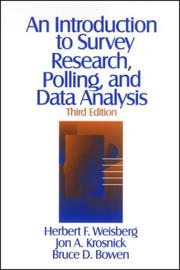| Listing 1 - 10 of 14 | << page >> |
Sort by
|

ISBN: 9781841694450 9781138802018 9781315445687 9781315445656 Year: 2017 Publisher: New York, NY : Routledge,
Abstract | Keywords | Export | Availability | Bookmark
 Loading...
Loading...Choose an application
- Reference Manager
- EndNote
- RefWorks (Direct export to RefWorks)
In recent decades, research in political psychology has illuminated the psychological processes underlying important political action, both by ordinary citizens and by political leaders. As the world has become increasingly engaged in thinking about politics, this volume reflects exciting new work by political psychologists to understand the psychological processes underlying Americans? political thinking and action. In 13 chapters, world-class scholars present new in-depth work exploring public opinion, social movements, attitudes toward affirmative action, the behavior of political leaders, the impact of the 9/11 attacks, and scientists? statements about global warming and gasoline prices. Also included are studies of attitude strength that compare the causes and consequences of various strength-related constructs. This volume will appeal to a wide range of researchers and students in political psychology and political science, and may be used as a text in upper-level courses requiring a scholarly and contemporary review of major issues in the field.
Political psychology. --- Psychologie politique --- Mass political behavior --- Political behavior --- Political science --- Politics, Practical --- Psychology, Political --- Psychology --- Social psychology --- Psychological aspects --- Political psychology
Book
ISBN: 3319543954 3319543946 Year: 2018 Publisher: Cham : Springer International Publishing : Imprint: Palgrave Macmillan,
Abstract | Keywords | Export | Availability | Bookmark
 Loading...
Loading...Choose an application
- Reference Manager
- EndNote
- RefWorks (Direct export to RefWorks)
This handbook is a comprehensive reference guide for researchers, funding agencies and organizations engaged in survey research. Drawing on research from a world-class team of experts, this collection addresses the challenges facing survey-based data collection today as well as the potential opportunities presented by new approaches to survey research, including in the development of policy. It examines innovations in survey methodology and how survey scholars and practitioners should think about survey data in the context of the explosion of new digital sources of data. The Handbook is divided into four key sections: the challenges faced in conventional survey research; opportunities to expand data collection; methods of linking survey data with external sources; and, improving research transparency and data dissemination, with a focus on data curation, evaluating the usability of survey project websites, and the credibility of survey-based social science. Chapter 23 of this book is open access under a CC BY 4.0 license at link.springer.com.
Surveys --- Government surveys --- Statistical methods. --- Mathematical geography --- Public policy. --- Statistics. --- Mathematical statistics. --- Public Policy. --- Statistics for Social Sciences, Humanities, Law. --- Statistical Theory and Methods. --- Mathematics --- Statistical inference --- Statistics, Mathematical --- Statistics --- Probabilities --- Sampling (Statistics) --- Statistical analysis --- Statistical data --- Statistical methods --- Statistical science --- Econometrics --- Statistics .
Digital
ISBN: 9783319543949 9783319543956 Year: 2018 Publisher: Cham Palgrave Macmillan
Abstract | Keywords | Export | Availability | Bookmark
 Loading...
Loading...Choose an application
- Reference Manager
- EndNote
- RefWorks (Direct export to RefWorks)
This handbook is a comprehensive reference guide for researchers, funding agencies and organizations engaged in survey research. Drawing on research from a world-class team of experts, this collection addresses the challenges facing survey-based data collection today as well as the potential opportunities presented by new approaches to survey research, including in the development of policy. It examines innovations in survey methodology and how survey scholars and practitioners should think about survey data in the context of the explosion of new digital sources of data. The Handbook is divided into four key sections: the challenges faced in conventional survey research; opportunities to expand data collection; methods of linking survey data with external sources; and, improving research transparency and data dissemination, with a focus on data curation, evaluating the usability of survey project websites, and the credibility of survey-based social science. Chapter 23 of this book is open access under a CC BY 4.0 license at link.springer.com.

ISBN: 0805810862 Year: 1995 Publisher: Mahwah, NJ : Lawrence Erlbaum Associates [LEA],
Abstract | Keywords | Export | Availability | Bookmark
 Loading...
Loading...Choose an application
- Reference Manager
- EndNote
- RefWorks (Direct export to RefWorks)

ISBN: 0803974027 0803974019 Year: 1996 Publisher: London Sage
Abstract | Keywords | Export | Availability | Bookmark
 Loading...
Loading...Choose an application
- Reference Manager
- EndNote
- RefWorks (Direct export to RefWorks)
Quantitative methods in social research --- Social sciences --- Social surveys --- Sciences sociales --- Enquêtes sociales --- Statistical methods --- Méthodes statistiques --- Social surveys. --- Statistical methods. --- Enquêtes sociales --- Méthodes statistiques

ISBN: 0805810870 9780805810875 Year: 1995 Volume: 4 Publisher: Mahwah Erlbaum
Abstract | Keywords | Export | Availability | Bookmark
 Loading...
Loading...Choose an application
- Reference Manager
- EndNote
- RefWorks (Direct export to RefWorks)
Attitude (Psychology) --- Attitude change --- Attitude (Psychologie) --- Changement d'attitude --- 316.6 --- Gedragstheorie. Sociaal gedrag. Sociale psychologie --(gedrag en zelfconcept van het individu in de groep z.o. {159.923.33}) --- Sociale psychologie --- Sociale psychologie. --- 316.6 Gedragstheorie. Sociaal gedrag. Sociale psychologie --(gedrag en zelfconcept van het individu in de groep z.o. {159.923.33}) --- Attitudes (Psychology) --- Psychology --- Public opinion --- Stereotypes (Social psychology) --- Change of attitude --- Change (Psychology) --- Judgment --- Social influence
Book
ISBN: 9780190938550 9780190938574 9780190938581 0190938587 0190938579 0190938552 Year: 2022 Publisher: New York, N.Y. Oxford University Press
Abstract | Keywords | Export | Availability | Bookmark
 Loading...
Loading...Choose an application
- Reference Manager
- EndNote
- RefWorks (Direct export to RefWorks)
"Scientific discoveries often build on - and are inspired by - previous discoveries. If the scientific enterprise were a tower of blocks, each piece representing a scientific finding, scientific progress might entail making the tower bigger and better block by block, discovery by discovery. Rather than strong wooden blocks, imagine the blocks, or scientific findings, can take on shape based on scientific accuracy. The most accurate pieces are the strongest and sturdiest, while the least accurate are soft and pliable. Building a tower of the scientific enterprise with a large number of inaccurate blocks will cause the tower to start to wobble, lean over, and potentially collapse, as more and more blocks are placed upon weak and faulty pieces"--
Science --- Professional ethics. Deontology --- Psychology --- Social sciences
Book

ISBN: 9781119941774 1119941776 Year: 2014 Publisher: Chichester Wiley
Abstract | Keywords | Export | Availability | Bookmark
 Loading...
Loading...Choose an application
- Reference Manager
- EndNote
- RefWorks (Direct export to RefWorks)
Book

ISBN: 0691222371 Year: 2021 Publisher: Princeton, NJ : Princeton University Press,
Abstract | Keywords | Export | Availability | Bookmark
 Loading...
Loading...Choose an application
- Reference Manager
- EndNote
- RefWorks (Direct export to RefWorks)
Why the social character of scientific knowledge makes it trustworthyAre doctors right when they tell us vaccines are safe? Should we take climate experts at their word when they warn us about the perils of global warming? Why should we trust science when so many of our political leaders don't? Naomi Oreskes offers a bold and compelling defense of science, revealing why the social character of scientific knowledge is its greatest strength—and the greatest reason we can trust it. Tracing the history and philosophy of science from the late nineteenth century to today, this timely and provocative book features a new preface by Oreskes and critical responses by climate experts Ottmar Edenhofer and Martin Kowarsch, political scientist Jon Krosnick, philosopher of science Marc Lange, and science historian Susan Lindee, as well as a foreword by political theorist Stephen Macedo.
Science --- SCIENCE / Philosophy & Social Aspects. --- Philosophy. --- Social aspects. --- Science and society --- Sociology of science --- Normal science --- Philosophy of science --- Adverse effect. --- Adviser. --- American Association for the Advancement of Science. --- Americans. --- Amgen. --- Authoritarianism. --- Biologist. --- Biomedicine. --- Blind experiment. --- Bruno Latour. --- Cambridge University Press. --- Climate change. --- Climatology. --- Continental drift. --- Covid-19. --- Criticism. --- Decision-making. --- Dental floss. --- Distrust. --- Empirical evidence. --- Empiricism. --- Environmental impact assessment. --- Environmentalist. --- Epistemology. --- Eugenics. --- Experiment. --- Explanation. --- Fallacy. --- Funding of science. --- Funding. --- Geneticist. --- Global warming. --- Governance. --- Graduate school. --- Greenhouse gas. --- Helen Longino. --- History and philosophy of science. --- Ideology. --- Institution. --- Karl Popper. --- Lecture. --- Logical positivism. --- Ludwik Fleck. --- Merchants of Doubt. --- Methodology. --- Misuse of statistics. --- Morality. --- Naomi Oreskes. --- National Science Foundation. --- Ottmar Edenhofer. --- Paradigm shift. --- Pascal's Wager. --- Peer review. --- Philosopher. --- Philosophy of science. --- Physician. --- Physicist. --- Political psychology. --- Political science. --- Politics. --- Potsdam Institute for Climate Impact Research. --- Princeton University. --- Psychology. --- Public health. --- Public policy. --- Publication. --- Rationality. --- Reason. --- Replication crisis. --- Reproducibility. --- Result. --- Sandra Harding. --- Science studies. --- Science, technology and society. --- Science. --- Scientific community. --- Scientific consensus. --- Scientific evidence. --- Scientific method. --- Scientific opinion on climate change. --- Scientific progress. --- Scientific revolution. --- Scientific theory. --- Scientist. --- Skepticism. --- Social science. --- Sociology. --- Statistical significance. --- Suggestion. --- Sunburn. --- Sunscreen. --- Symptom. --- Tax. --- Technology. --- Theory. --- Thomas Kuhn. --- Thought. --- Vaccination. --- Vetting.
Digital

ISBN: 9780691222370 Year: 2021 Publisher: Princeton, N.J. Princeton University Press
Abstract | Keywords | Export | Availability | Bookmark
 Loading...
Loading...Choose an application
- Reference Manager
- EndNote
- RefWorks (Direct export to RefWorks)
| Listing 1 - 10 of 14 | << page >> |
Sort by
|

 Search
Search Feedback
Feedback About UniCat
About UniCat  Help
Help News
News